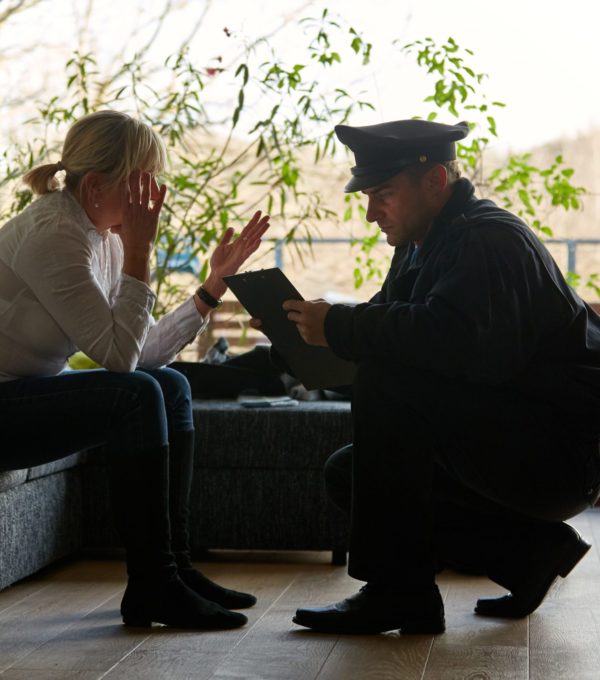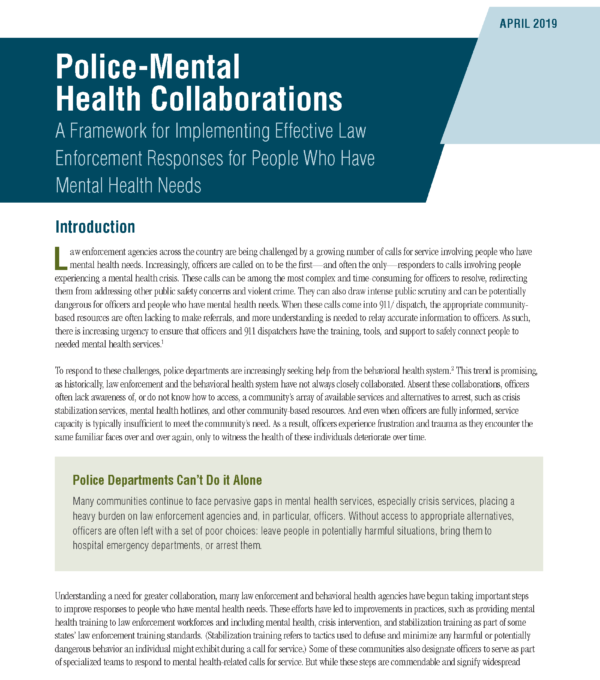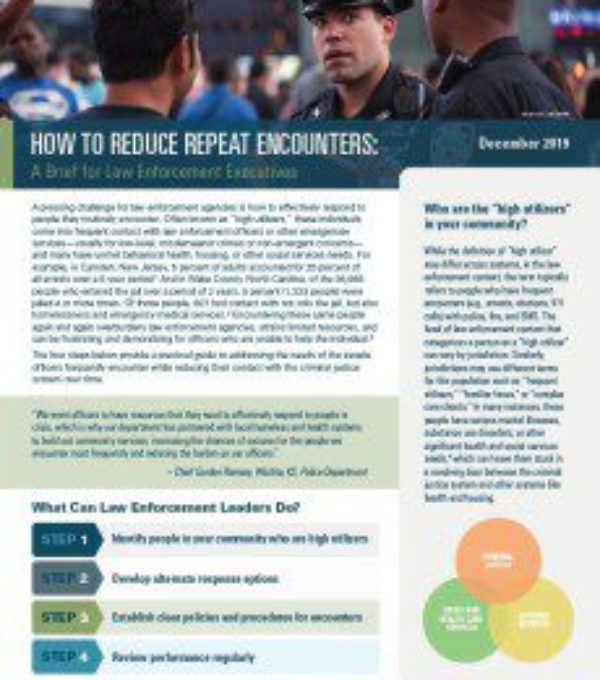Law Enforcement-Mental Health Collaboration Support Center
The Law Enforcement-Mental Health Collaboration Support Center offers free training, resources, and support to communities wanting to improve their law enforcement and community responses to people with behavioral health conditions or intellectual and developmental disabilities.
This includes helping jurisdictions develop police-mental health collaborations, which are high quality partnership-based interventions, co-designed by law enforcement and health agencies, to help officers safely and effectively respond to calls for service involving people with behavioral health needs.
Jurisdictions requesting support are encouraged to use the police-mental health collaboration self-assessment to help assess progress toward implementing police-mental health collaboration programming. The self-assessment tool can be accessed here.
The Law Enforcement-Mental Health Collaboration Support Center is administered by The Council of State Governments (CSG) Justice Center with support from the U.S. Department of Justice’s Bureau of Justice Assistance (BJA).
Available Support
What does the Law Enforcement-Mental Health Collaboration Support Center do?
The goal of the center is to connect law enforcement agencies and their partners with the resources, knowledge, and skills necessary to respond to people at the intersection of law enforcement and behavioral health. Support is designed to meet your needs and can range from reviewing training protocols to sharing sample policies, advising on program design, connecting you with subject experts for consultations, and various other types of support.
Who is eligible to apply?
Any state, locality, or federally recognized tribal government, as well as organizations such as non-profit behavioral health organizations, criminal justice agencies, and service providers, can request assistance from the Law Enforcement-Mental Health Collaboration Support Center. Once you submit the request form, a staff member from the CSG Justice Center will contact you within two business days.
What types of training and support are offered?
The center offers assistance that is tailored to meet your needs through a variety of formats including responding to questions via e-mail, virtual and in-person consultations, connections with subject experts, connections to other jurisdictions for peer learning including via the Law Enforcement-Mental Health Learning Sites, and webinars or other virtual events.
What are some examples of assistance you have provided?
Through the Justice and Mental Health Collaboration Program (JMHCP), which is a Department of Justice grant program dedicated to providing resources to implement programs, the CSG Justice Center has provided specialized support to more than 120 law enforcement grantees over the past decade. Below are some examples:
Cedar Rapids, Iowa
The Cedar Rapids Police Department wanted to reduce the need for police-level action after they saw a 68-percent increase in crisis calls in just 5 years, going from 958 in 2013 to 1,596 in 2018.
The CSG Justice Center provided training and support to Cedar Rapids to develop a co-responder program, in which a crisis counselor accompanies a police officer to calls for service for people in mental health or substance use crisis. In its first year, the program was able to support over 200 people, diverting those in need away from the criminal justice system and unnecessary hospitalizations and into the behavioral health system. Still in its early stages, the partnership is also helping officers begin to refocus their efforts on people and crimes that require police attention, while still providing initial support for people with behavioral health needs.
Read more: “Cedar Rapids, Iowa, Bridges Gap Between Police and the Community”
Harris County, Texas
The Houston Police Department (HPD)’s Mental Health Division planned to enhance their partnership with the Harris Center for Mental Health and Intellectual and Developmental Disabilities (IDD) and develop a program that helped reduce police encounters for people with mental health or suicidal needs.
With support from the CSG Justice Center and the Law Enforcement-Mental Health Learning Sites, HPD expanded their efforts with the Harris Center and developed a Crisis Call Diversion program, which embedded six mental health phone counselors in the Houston Emergency Center. As of 2018, the program featured counselors who were available seven days a week, from 7 a.m. to 2 a.m. to work with people who call 911 for a mental health-related issue to possibly de-escalate the situation, connect callers to services, and otherwise help them find a solution that may not involve a police response. HPD saw a drastic decrease in police-level involvement following the program’s implementation, diverting approximately 20,000 phone calls from fire/EMS or police units in 2017.
How can I request support?
To learn more about the Law Enforcement-Mental Health Collaboration Support Center’s free training and resources, please contact the CSG Justice Center by phone (1-888-920-0782) or email LEsupport@csg.org. Additional resources are also available through the International Association of Chiefs of Police.
Events

This webinar is the first session on strategic planning for FY19 Category…
Read More
This webinar provides an overview of PMHC programs—collaborative partnerships among law enforcement…
Read More
In this webinar presenters discuss the unique challenges that law enforcement and…
Read MoreResources

This tool is designed to provide resources to help improve responses to…
Read MoreSignup
Partners
The Law Enforcement-Mental Health Collaboration Support Center is funded by the U.S. Department of Justice’s Bureau of Justice Assistance. The Council of State Governments Justice Center leads the center, in partnership with:
-
- The Arc
- CIT International, Inc (CITI)
- Health Management Associates (HMA)
- Integrated Justice Information Systems Institute (IJIS)
- International Association of Chiefs of Police (IACP)
- National Alliance on Mental Illness (NAMI)
- National District Attorneys Association (NDAA)
- National Police Foundation (NPF)
- National Sheriffs’ Association (NSA)
- Tribal Justice Institute (TJI)
- Western Community Policing Institute (WCPI)
This program was supported by Grant No. 2019-NT-BX-K001 awarded by the Bureau of Justice Assistance. The Bureau of Justice Assistance is a component of the Department of Justice’s Office of Justice Programs, which also includes the Bureau of Justice Statistics, the National Institute of Justice, the Office of Juvenile Justice and Delinquency Prevention, the Office for Victims of Crime, and the SMART Office. Points of view or opinions on this webpage are those of the authors and do not necessarily reflect the official positions or policies of the U.S. Department of Justice.













